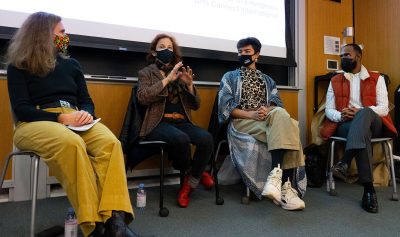The industries of arts and innovation can be seen as two separate entities. But, on Monday, a panel hosted by Boston University focused on merging the two terms and understanding the role of creative entrepreneurs in today’s society.

The “Creative Entrepreneurship Panel” event featured Jonathan Allen, co-founder of the Leadership Brainery and this year’s BUild Lab Innovator in Residence, Julie Leven, founder of Shelter Music Boston, Micah Rosegrant, co-director of Emergence Arts Connect International, and Judy Braha, director and program head of MFA directing in the College of Fine Arts.
Wendy Swart Grossman, adjunct lecturer in the Graduate School of Arts Administration, and Jodi Luber, associate dean, faculty and student actions at the College of Communication, organized the panel as an extension of their two collaborative graduate classes — “Media Ventures: Creating New Ideas” and Swart Grossman’s creative entrepreneurship class in the Metropolitan College.
Swart Grossman said that she met Luber through the Faculty Innovation Network. She said she and Luber saw the potential for collaboration between their thematically similar courses.
“Our classes are similar. We work with creatives, we work with innovation and entrepreneurship,” Swart Grossman said in an interview. “Wouldn’t it be cool if somehow we could have our people meet each other?”
Swart Grossman said her “entry point” for the conference was creativity and breaking from the common definition of entrepreneurship.
“I’m working with visual artists, sculptors, performing artists, musicians, as opposed to where so many times we think of innovators and entrepreneurs as coming from computer science and business and engineering,” Swart Grossman said. “We need to break this open, and our students need to be at this table.”
Panelist Rosegrant, a 2021 graduate of CFA, shared their philosophy about community organizing during the panel.
“I come from a process of feeling isolated in certain spaces, finding other people have those paralleling experiences of isolation, and then reclaiming space as a way for us to more meaningfully build a future in which we are all treated as sacred as we are,” Rosegrant said.
Rosegrant also focused on the importance of “anti-linear” relationships, not just with others but with oneself.
“These relationships don’t need to happen on any sort of chronology, on any sort of sequence of events,” Rosegrant said. “If I’m not grounded in the very body through which I’m operating, then I don’t believe that I can sustain any relationship outside of me.”
Allen also echoed the importance of maintaining a strong relationship with yourself.
“I tell people all the time that leaders who are concerned with social transformation must take care of themselves by developing self-awareness, social awareness and spiritual self-awareness,” Allen said after Rosegrant during the panel.
Sohyoung Park, a graduate student in CFA, is enrolled in Swart Grossman’s entrepreneurship class. Park said the panel was inspirational.
“They are already out there and building their own companies,” Park said in an interview. “Listening to their experience was very helpful, and I learned a lot of things from their experience and how they succeeded.”
The arts and creativity are the “launchpad for innovation,” and creative thinkers are needed to help change the system, Swart Grossman said. She also said she wanted the panel to foster student teamwork between departments colleges at BU.
“This is why we’re doing this,” Swart Grossman said. “We need to get out of our silos … so we can expand our way of thinking and see what questions we can come up with and together we can find some cool solutions.”
As Innovator in Residence, Allen said in an interview he hoped students would learn to “not hold back their value, their worth and all of the creative energy that they possess.”
“I hope people will walk away [from the panel] with a sense of hope, a sense of urgency, a sense of encouragement and inspiration to go after it and to not give up when it gets tough because entrepreneurship is not easy,” Allen said.
Allen highlighted the need for students to “think outside the box.”
“I want to really supercharge people to tap into their innovative and entrepreneurial mindsets,” Allen said in an interview.
Another panelist, Leven, founded Shelter Music Boston, an organization founded to “provide classical chamber music concerts, performed by professional working positions in homeless shelters and substance misuse recovery centers,” she said.
Like Allen, Leven spoke about perseverance in the face of “resistance” from others.
“One of the things I learned is if your mission is strong … and one sticks to it, it will succeed,” Leven said in an interview. “It will require an ordinate amount of time and energy … you just got to work hard to do it.”
Panel moderator Jen Guillemin, who works with Grossman at Creative Re/Frame, a consulting agency that works to improve creativity and innovation through arts integration, highlighted the importance of creative entrepreneurship.
“This is the work of creative entrepreneurs,” Guillemin said at the event. “This is rethinking how we structure businesses, how we structure systems, so they’re equitable, they’re fair, they’re inclusive, and everybody has a part.”



























































































































